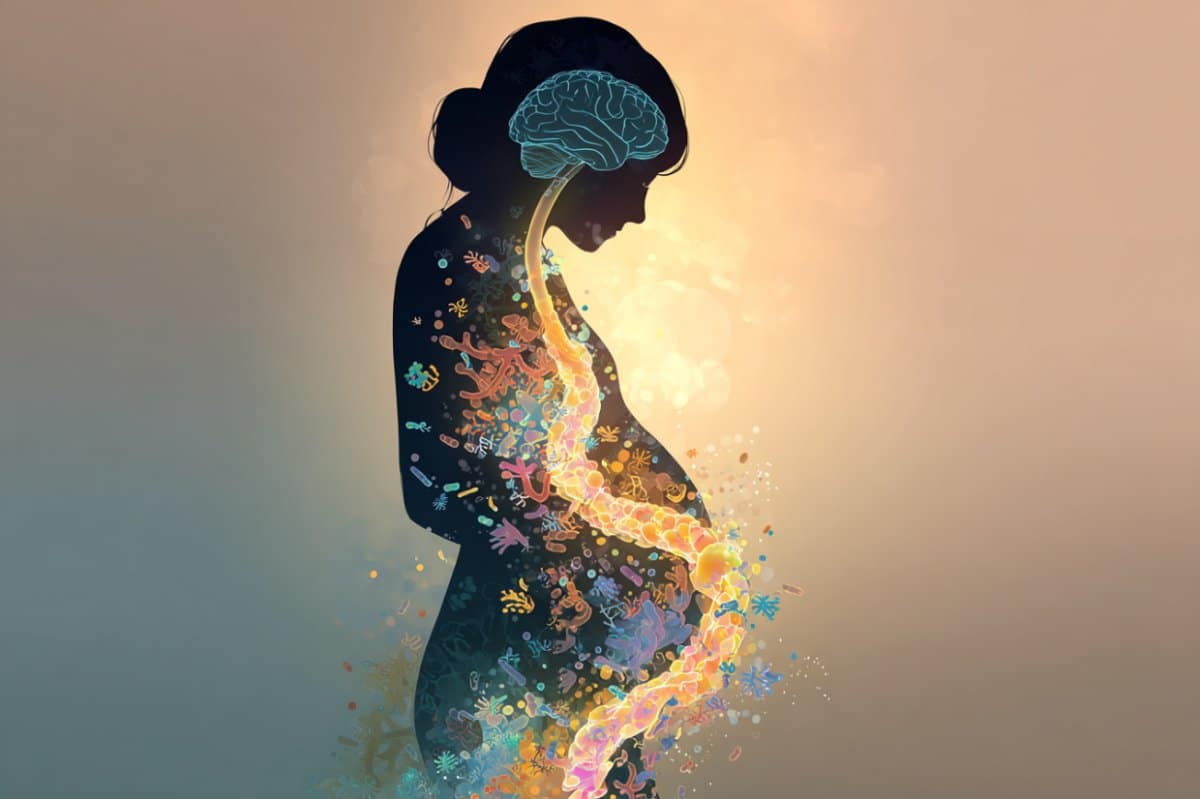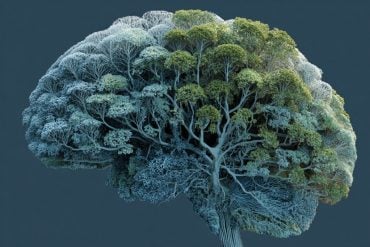Summary: Prenatal stress in mothers can leave a lasting imprint on their offspring, predisposing them to depression-like behaviors. Researchers found that maternal stress disrupts the gut microbiome and metabolite production, which are vertically transmitted to the young.
This microbial dysbiosis was linked to neurotransmitter imbalances and inflammation in the offspring’s prefrontal cortex, a region critical for mood regulation. These findings reveal the gut-brain axis as a key mediator of cross-generational mental health effects.
Key Facts
- Gut-Brain Axis: Maternal stress altered the mother’s gut microbiome and passed these changes to her offspring, affecting brain chemistry.
- Neuroinflammation: Offspring showed increased neuroinflammation and disrupted neurotransmitters linked to depressive behaviors.
- Vertical Transmission: Specific bacterial species and metabolic pathways were inherited and correlated with mood and immune changes.
Source: Neuroscience News
The delicate interplay between the brain and the gut is one of the most exciting frontiers in neuroscience today, and new research sheds light on how maternal stress during pregnancy may imprint depression-like behaviors on offspring, mediated by changes in the gut microbiome.
In a carefully controlled study on rats, scientists have revealed how psychological stress in pregnant mothers reshapes their gut microbiota, passes those changes on to their young, and disrupts neurotransmitter balance and inflammation in their developing brains.

These findings provide crucial insights into how stress “echoes” across generations, and how the gut-brain axis could become a key target in preventing mood disorders.
Stress Before Birth Leaves a Mark
It has long been observed that children of stressed or depressed mothers are more likely to experience emotional difficulties themselves. Prenatal stress has been linked to altered infant temperament, increased anxiety, and even clinical depression later in life. But what biological mechanisms transmit these effects from mother to child?
One pathway gaining attention is the gut microbiome — the community of bacteria living in the digestive tract, which is known to influence immunity, metabolism, and even mood. Because a newborn’s microbiome is largely inherited from the mother, disturbances in her gut could ripple forward, potentially altering the child’s neurodevelopment.
The new study set out to explore this question directly. Using a rat model of pregnancy psychological stress (PPS), researchers exposed pregnant rats to unpredictable fear-inducing stimuli throughout gestation.
After birth, their pups were raised normally but displayed clear signs of depression-like behavior at puberty: reduced interest in pleasurable activities, increased despair in stress tests, and hyperactive stress hormone responses.
These behavioral changes in the offspring mirrored those seen in their stressed mothers — suggesting a biological continuity across generations.
The Gut-Brain Connection
To probe the microbiome’s role, the researchers collected fecal samples from both the stressed mothers and their offspring, performing a detailed analysis of microbial composition and function.
They discovered that PPS mothers exhibited gut microbial dysbiosis — a disrupted community balance — with increases in families such as Bacteroidaceae and Myoviridae and decreases in beneficial Lactobacillaceae.
Importantly, their offspring inherited these imbalances, even without direct stress exposure themselves.
Seven specific bacterial species showed the same pattern of alteration in both mothers and pups, including Prevotella, Bacteroides zhangwenhongi, and Ruminococcus bovis. These vertically transmitted microbes were strongly associated with depressive behaviors and altered brain chemistry.
Metagenomic and metabolomic analyses revealed that these microbial changes translated into altered metabolic activity, specifically, increased activity in pathways involving glycine, serine, and threonine metabolism. These amino acids are crucial for neurotransmission and neurodevelopment, and the overactivation of these pathways has been implicated in mood disorders.
Neurotransmitter Imbalance and Inflammation
The team then examined the brains of the adolescent offspring, focusing on the prefrontal cortex — a region central to mood regulation. Consistent with the gut findings, they observed elevated levels of serine and glycine in the brain, along with imbalances in key neurotransmitters: reduced dopamine and serotonin, increased norepinephrine, and disruptions in the excitatory/inhibitory balance between glutamate and GABA.
In addition to these neurochemical changes, the pups’ brains showed signs of chronic low-grade inflammation, with elevated pro-inflammatory cytokines such as TNF-α and IL-1β. This is particularly significant, as neuroinflammation is increasingly recognized as a contributor to depression.
Together, these findings paint a compelling picture: maternal stress disrupts the gut microbiota, altering its ability to produce key metabolites. These microbial shifts are passed to the next generation, influencing brain chemistry and immune function in ways that predispose offspring to depression-like behaviors.
Implications and Future Directions
This work underscores the importance of maternal mental health during pregnancy — not just for the mother’s sake but also for the long-term mental well-being of her children.
It also highlights the gut microbiome as a potential mediator of cross-generational effects, suggesting that microbiota-targeted therapies (like probiotics or dietary interventions) might one day help break the cycle of stress and depression.
However, the researchers note that more work is needed to confirm causality. Experiments using germ-free animals, fecal transplants, and larger sample sizes will help determine whether altering the microbiome can prevent or reverse these changes.
Moreover, future studies should examine the long-term stability of these effects into adulthood and whether there are sex-specific differences in vulnerability.
The Bigger Picture
This study fits into a growing body of research suggesting that the gut-brain axis is central to emotional health. Gut microbes communicate with the brain through metabolites, immune signaling, and the vagus nerve, influencing mood, cognition, and stress resilience. If the maternal microbiome is compromised by psychological stress, it appears to set in motion a chain of biological events that can shape her child’s emotional life.
By identifying specific bacteria and metabolic pathways involved in this process, the current research provides a roadmap for future studies — and perhaps future therapies. While still in its early stages, this line of inquiry offers hope that we may one day be able to mitigate the impact of prenatal stress and support mental health across generations.
About this pregnancy, mental health, and microbiome research news
Author: Neuroscience News Communications
Source: Neuroscience News
Contact: Neuroscience News Communications – Neuroscience News
Image: The image is credited to Neuroscience News
Original Research: Open access.
“Prenatal psychological stress mediates vertical transmission of gut microbiome to the next generation affecting offspring depressive-like behaviors and neurotransmitter” by Yuexuan Liu et al. BMC Psychology
Abstract
Prenatal psychological stress mediates vertical transmission of gut microbiome to the next generation affecting offspring depressive-like behaviors and neurotransmitter
Objective
Prenatal stress has been proven to be associated with dysbiosis of the gut microbiota. Despite the established phenomenon that psychological stress can be transmitted to offspring and the ability of maternal gut microbiota to colonize the offspring’s gut through vertical transmission, the intricate relationships linking cross-generational depression with the microbiome remain poorly understood.
Methods
We utilized combined fear stress stimuli to establish a pregnancy psychological stress (PPS) rat model, in which offspring exhibited trans-generational depression-like behavior. The relationship between vertical transmission of the gut microbiome, intergenerational effects, and psychological stress in offspring was investigated using microbiology and metabolomics.
Results
We demonstrated that the vertical transmission of co-altered species from PPS dams to their puberty offspring was strongly associated with dysbiosis of the gut microbiota in the offspring. In terms of microbial function, both PPS dams and their offspring exhibited upregulation of glycine, glutamate, and serine metabolism in fecal samples, as revealed by untargeted metabolomics.
Additionally, this microbial trans-generational effect was reflected in the prefrontal cortical tissue of PPS offspring, where serine in the pathway and its interconverted glycine was significantly increased.
Furthermore, the co-altered species and metabolites of the pathway formed a highly correlated module with disordered inflammatory factors and neurotransmitters in the prefrontal cortex tissue of PPS offspring.
This indicates that the microbiome plays a significant role in prefrontal cortex neuroinflammation as well as neurotransmitter disorders in depression-like offspring.
Conclusions
Our findings highlight the gut microbiome as a plausible mediator of prenatal stress effects on offspring neurodevelopment, though further mechanistic validation is required.






